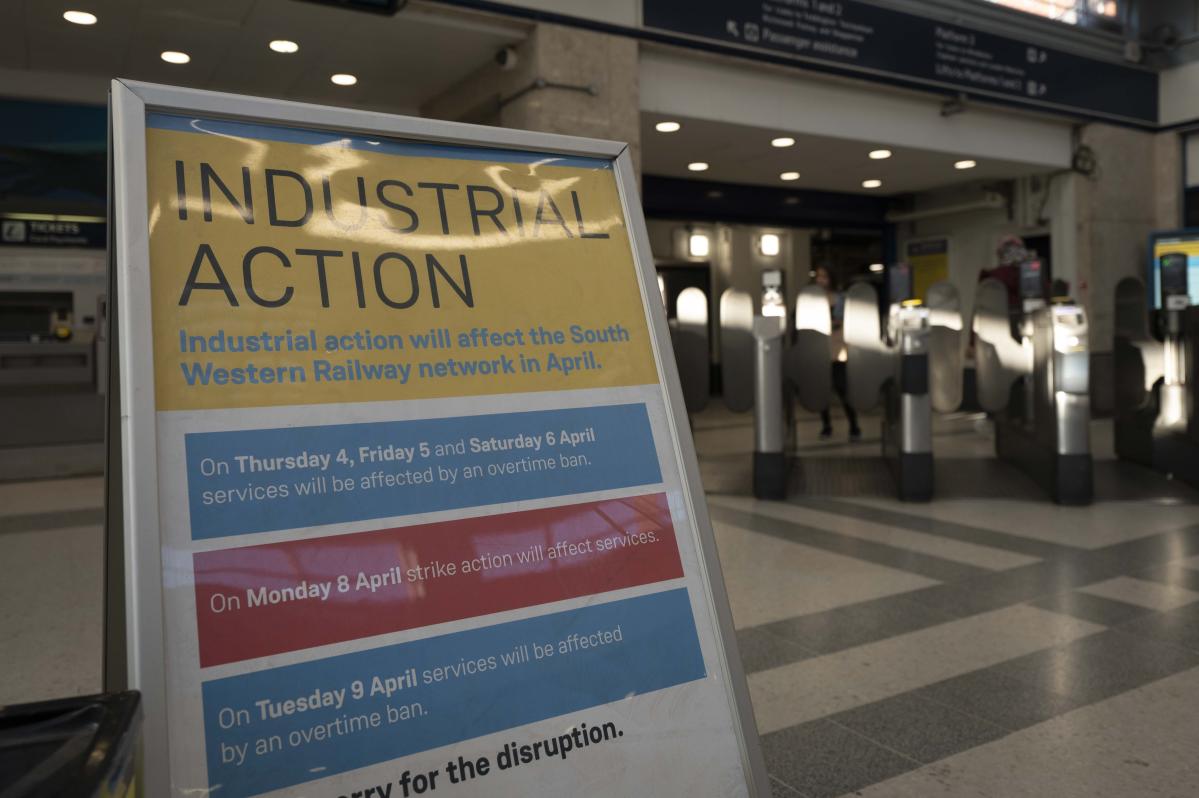Rail users are facing four days of disruption and delays from Friday as train drivers stage a fresh round of strikes in a long-running dispute over pay.
Aslef union members will stage three one-day strikes at 16 different train operators across England on dates between Friday and Monday, while London Underground drivers have also announced a 24-hour walkout on Monday.
National Rail has warned that an overtime ban from 4 April to 6 April, and from 8 April to 9 April could also significantly impact the already reduced train timetables.
Information on the National Rail website warned passengers to expect “significant disruption” on the days when full strike action is taking place, as it is likely to result in little or no services across large areas of the networks operated by the affected train companies.
Services are also likely to be disrupted and start later on the day immediately following a full strike day, and on days where an overtime ban is in place, while the timetable for some train companies may be subject to short-notice delays or cancellations on the day.
What train lines are affected by the strikes?
-
Friday 5 April – Avanti West Coast, CrossCountry, East Midlands Railway, London Northwestern Railway and West Midlands Railway.
-
Saturday 6 April – Chiltern Railways, Great Western Railway, Heathrow Express, LNER, Northern and TransPennine Express.
-
Sunday 7 April – disrupted services due to strikes on days either side and reduced Sunday services.
-
Monday 8 April – c2c, Gatwick Express, Greater Anglia (including Stansted Express), Great Northern, Southeastern, Southern, South Western Railway (including Island Line) and Thameslink, as well as London Underground.
Why are train drivers striking?
The strikes are the result of a long-running dispute over pay and conditions between the Aslef union and train operators. Aslef has said it wants to increase the pressure on the “intransigent” train companies and the “tone-deaf” government, as drivers have not received pay rises since 2019.
Aslef general secretary Mick Whelan said: “Last month, when we announced renewed mandates for industrial action, because under the Tories’ draconian anti-union laws we have to ballot our members every six months, we called on the train companies, and the government, to come to the table for meaningful talks to negotiate a new pay deal for train drivers who have not had an increase in salary since 2019.
“Our members voted overwhelmingly – yet again – for strike action. Those votes show a clear rejection by train drivers of the ridiculous offer put to us in April last year by the Rail Delivery Group (RDG) which knew that offer would be rejected because a land grab for all the terms and conditions we have negotiated over the years would never be accepted by our members.
Read more:
“We have given the government every opportunity to come to the table but it is now clear they do not want to resolve this dispute. They are happy for it go on and on.”
Minister for Transport Mark Harper has previously condemned Aslef strikes as “politically motivated”. Ahead of strikes in September last year he wrote on X: “You may hear the usual hand-wringing response from Labour on this, but as long as they still take cash from ASLEF to have Mick Whelan sit on their NEC, their words are hollow. They’re nothing but puppets who dance to the tune of their union paymasters.
“ASLEF’s cynical strikes… are politically motivated. Train drivers are paid an average of £60k for a 35-hour, 4 day week. There’s an offer on the table to take that up to £65k – and still they strike, putting their own jobs at risk.”
ASLEF’s cynical strikes on 30 Sept & 4 Oct are politically motivated.
Train drivers are paid an average of £60k for a 35-hour, 4 day week.
There’s an offer on the table to take that up to £65k – and still they strike, putting their own jobs at risk.https://t.co/MUko5HMUih
— Mark Harper (@Mark_J_Harper) September 15, 2023
A Department for Transport spokesman said: “Aslef is the only rail union continuing to strike, targeting passengers and preventing their own members from voting on the pay offer that remains on the table. Having resolved disputes with all other rail unions, the Transport Secretary and rail minister have ensured that a pay offer is on the table – taking train drivers’ average salaries from £60,000 up to £65,000.”
An LNER spokesman said: “Our priority focus remains on minimising disruption to customers. We continue to encourage Aslef to work with us to find a way to end this long-running dispute.”










